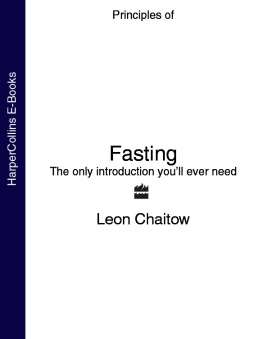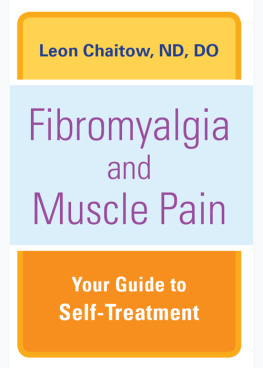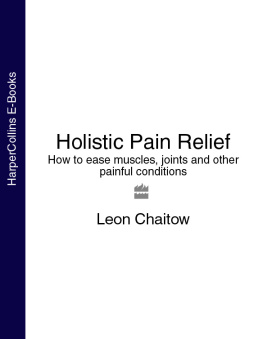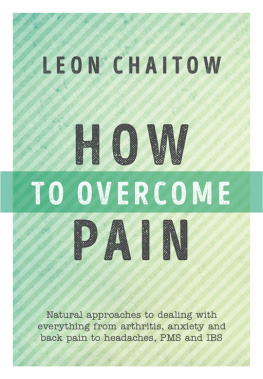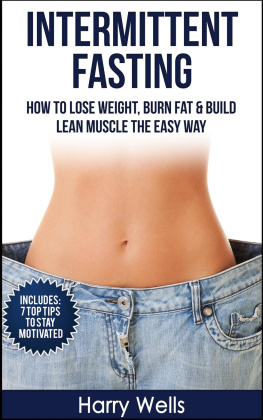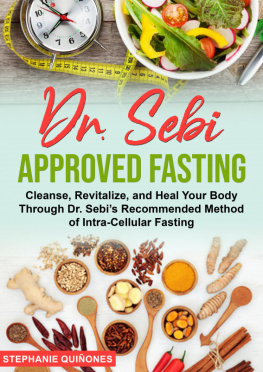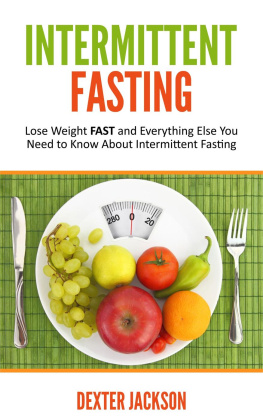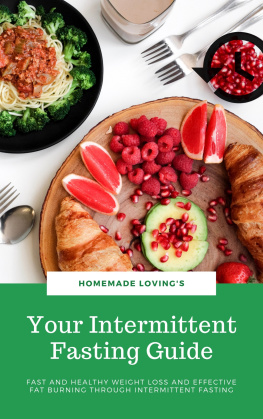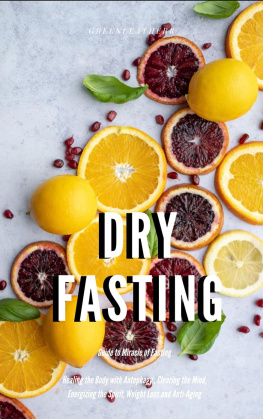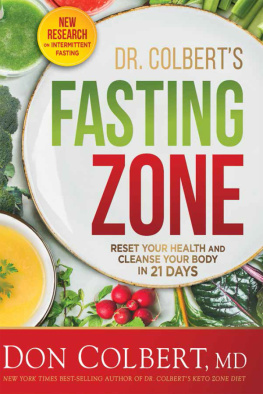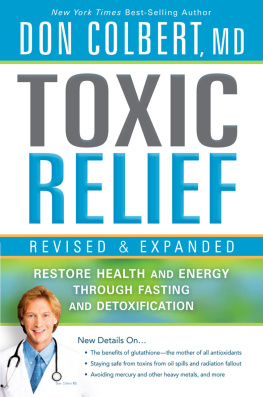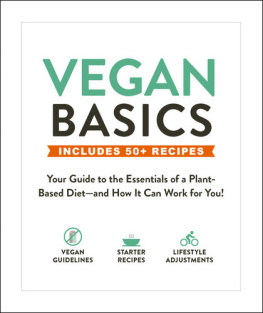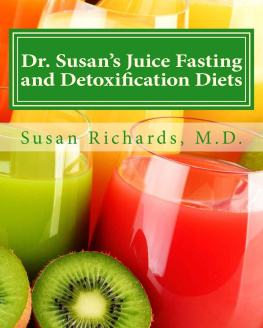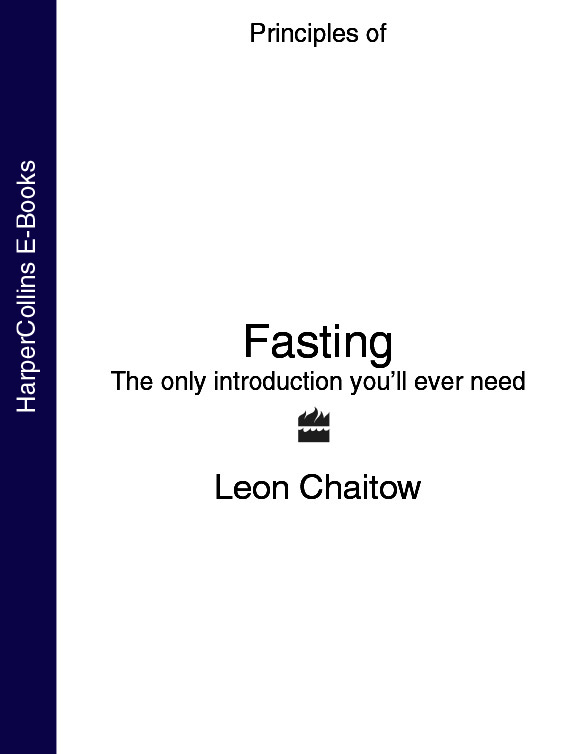Principles of Aromatherapy
Cathy Hopkins
Principles of Buddhism
Kulananda
Principles of Chinese Medicine
Angela Hicks
Principles of Colonic Irrigation
Jillie Collings
Principles of the Enneagram
Karen Webb
Principles of Hypnotherapy
Vera Peiffer
Principles of NLP
Joseph OConnor and Ian McDermott
Principles of Nutritional Therapy
Linda Lazarides
Principles of Paganism
Vivianne Crowley
Principles of Reflexology
Nicola Hall
Principles of Self-Healing
David Lawson
Principles of Stress Management
Vera Peiffer
Principles of Tarot
Evelyn and Terry Donaldson
The publishers would like to thank Jillie Collings for her suggestion for the title of this series, Principles of
Contents
T he evidence offered in this book about the possible value of therapeutic fasting should be understood to be provided for information only, and not as a recommendation in any particular case for the use of fasting as a therapeutic intervention.
If any fast is undertaken for longer than 48 hours it is strongly suggested that a suitably qualified, competent and experienced health care professional (see ) should be consulted for advice and to ensure that supervision is available.
Fasting is to be actively discouraged outside of a residential setting for anyone with an eating disorder (such as anorexia and bulimia) or who suffers from any form of mental disease which requires medication to control it. Fasting is particularly contraindicated for anyone who does not fully understand and agree with its application.
The author and publishers specifically caution against lengthy fasting (anything longer than two days) without expert supervision.
A t the age of 12 I experienced acute abdominal pain, and a doctor advised immediate hospitalization for removal of my appendix. My mother had also asked for advice from my fathers brother, a noted naturopath and chiropractor, Boris Chaitow (cousin of Stanley Lief, of whom more later).
My uncle Boris took the extraordinary many would say irresponsibly foolhardy step of advising against surgery, and placed me on a water fast. During the following 10 days I (a most unco-operative patient!) was subjected to the indignity of regular tepid enemas, as well as hot and cold packs and a water-only regime.
A few key facts are clearly embedded in my memory that after the first day I lost all interest in and desire for food; that I detest enemas, and that I felt extremely well during the last week of the fast, with no sign of the agonizing pain previously experienced.
I am well aware that the whole enterprise could have turned out disastrously had my appendix ruptured, as the doctor had envisaged if surgery was delayed. But it did not, and I still have both it and a firm conviction based on personal experience of the value of therapeutic fasting. Incidentally, at the time of writing, Boris Chaitow is alive and well and just short of his 90th birthday.
Having subsequently trained in osteopathy and naturopathy (of which fasting forms an important element) I have over the years advised many patients with a variety of health complaints to fast but have never had the nerve to risk what Boris (and my parents) risked with my appendicitis nor do I recommend anyone else to do so.
FASTING DEFINED
Fasting is the avoidance totally or partially of the eating of food and liquid, except for pure water, for a particular period of time.
There are also a number of modified versions of fasting which allow the taking of juices, and even some foods, as part of their protocols. There are mono-diets (single food fasting such as the grape cure), dry fasts (eating dry rusks with minimal liquid intake, as in the Schroth Cure), juice fasts and herb tea fasts.
In absolute terms, these methods are not really fasts at all, but restricted diets. However, since they offer some of the benefits of fasting (especially if repeated regularly) they are included as possible alternatives.
FASTING IS NOT STARVATION
Not eating does not mean that you are starving. There is, in most people, enough reserve food stored to last for many days usually many weeks. So, during a controlled therapeutic fast the body does not use any of its essential tissues as fuel, but instead burns or metabolizes fat stores. At the same time a variety of important detoxification and repair processes begin which are of immense value to health, and these are explained in detail in later chapters.
RIGHT AND WRONG WAYS OF FASTING
The use above of the word controlled is meant to indicate that there are right and wrong ways of fasting, and just what should and should not be done when a fast is undertaken (to ensure both safety and effectiveness) is very carefully outlined as we look at the long history and use of fasting for health.
Probably the most undesirable way to fast is if you have a particular health problem and stop eating, fail to drink sufficient water and/or continue to take non-essential medication. Note that insulin, thyroid hormone and, in some instances, prednisone are regarded as essential if you have become dependent upon their continued use to the extent that stopping their intake could produce a violent and possibly fatal result.
The way a fast is conducted, and the way it is broken, are very important indeed, and you are urged to read all of this book, not just parts of it, and to fully appreciate the guidance offered before experimenting with a fast. Serious problems have been known to occur when rules are broken during fasts.
To effectively and safely use fasting as a means of restoring (and maintaining) good health, it is necessary to fully understand the self-healing functions of the body and how they operate. These are explained in this book, and once you have grasped them and are fully aware of the rules, the potential of this marvellous method of regeneration is open to you, should you choose to use it.
FIRST CHOICE IN FEVER
There is probably no more powerful healing method than therapeutic fasting when it is applied correctly and used responsibly and safely, since fasting does not impose a solution on the disturbed workings of the body, but allows it space and time, a period of physiological rest, during which healing can occur naturally.
In acute conditions, most notably fevers and infections, it should be the first choice of health care, since fasting dramatically increases the efficiency of the immune function, at least for the first 24 to 36 hours.
In chronic conditions, such as heart disease, rheumatoid arthritis, ulcerative colitis, psoriasis and eczema, there is a huge amount of evidence showing that controlled and supervised fasting can help such stubborn and sometimes life-threatening conditions to clear completely.
LONG OR SHORT FASTS?
In the UK, between the First and Second World Wars, Stanley Lief ND, DC, the gifted naturopathic healer, supervised thousands of successful lengthy fasts at Champneys, the health resort in Hertfordshire which he ran for over 30 years. The longest fast recorded at Champneys lasted for over three months (95 days), the outcome of which was the patients complete recovery from chronic ill-health (I know because I met the patient some 30 years later during my own working period at Champneys in the early 1960s).

